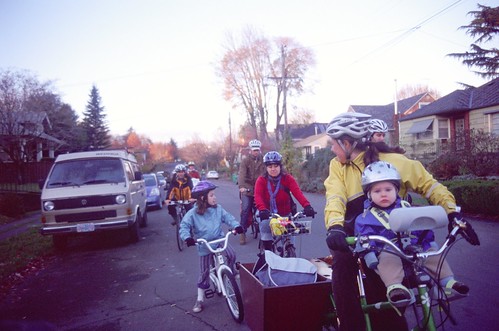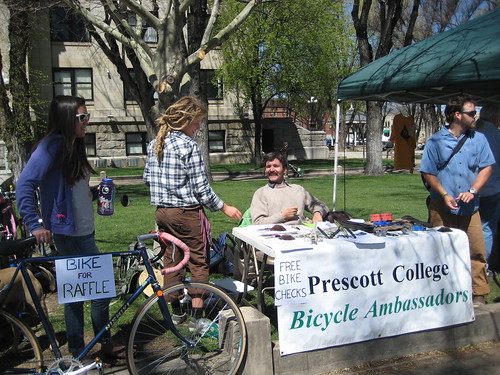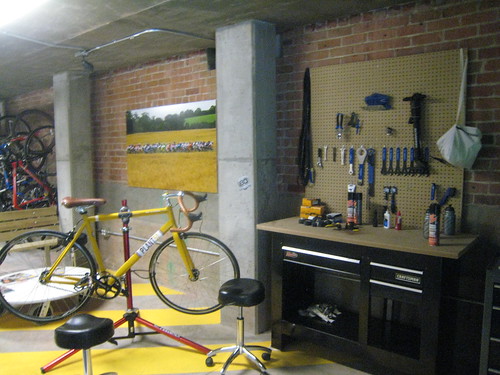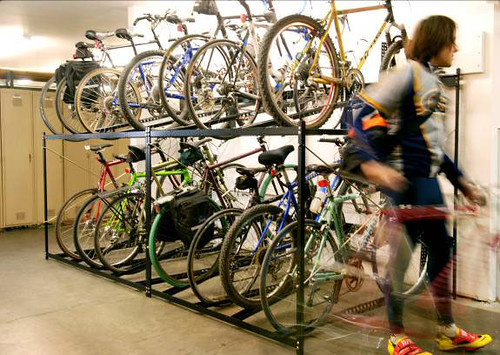More on bike issues
1. In breaking news, AASHTO, the American Association of State Highway and Transportation Officials, has retracted their submission to the US Department of Transportation, which had called for the rescinding of guidance concerning the inclusion of bicycle and pedestrian accommodation in federally funded transportation projects.
According to the report the lesson learned is: "a lock isn't a sure thing, even in the comforts of a secure building, nothing's really safe."
Really, what the lesson ought to be is that too frequently, building regulations are inadequate in defining how bike parking should be provided in multiunit residential buildings. Because this building clearly does not provide bicycle parking that meets any accepted standard for secure, long term parking.
Part of the problem is that most bicycle plans and building regulations inadequately define the difference between the needs for short term bicycle parking versus long term bicycle parking. One exception is the City of Toronto. See their Guidelines for the Design and Management of Bicycle Parking Facilities for advice, which states in the section on long term parking:
Long-term bicycle parking is intended for use over several hours or overnight. As a result, this parking must be designed to protect bicycles parked for longer periods of time. ...
Bicycle cages restrict access to bicycle parking racks through an electronic key pad, security pass card or a similar type of system. Good quality racks are installed inside the cage and bicycles are locked to these racks. ...
Indoor bicycle rooms. Underground parking facilities offer many good options to accommodate high quality, long term bicycle parking. This can only qualify as long term parking if access to the parking garage is controlled or if the bicycle racks are otherwise secured (i.e. a bike cage, separate locked room or bicycle lockers). Providing more than one level of security (i.e. controlled access to garage + bicycle cages or lockers) will further improve the quality of the parking.
The Logan Circle garage referenced in the story meets none of these characteristics. It doesn't even provide parking accommodations for bicycles. People lock bikes around strucural pillars. There aren't racks. There isn't a bike parking room with secure access (building security cards or key code access).
Yes, you can say this is self-serving, since the startup business I work for provides bicycle parking solutions, but it is frustrating nonetheless because this problem has an easy solution. Although it is best if the solution is part of the design of the building before it is even constructed. (And that is something that our business is focused on in particular. ) So sure, if you want to get high quality bike parking in your apartment or condominium, contact me (I need the money).
We are working with a municipality in the Baltimore region on creating a model bicycle garage parking facility demonstrating four different types of bicycle rack solutions (wall, double level, stadium rack inverted U, and a BikeArc product) installed in one place, so that they can provide great bicycle parking for municipal workers located in a number of adjacent buildings, also being able to use the facility to show property managers and other interested parties different ways of providing quality bicycle parking in their buildings.
Kidical Mass, the national movement to organize safe, fun bike riding for families on city streets, will come to Washington DC for the first time this April. On Saturday, April 23, families will gather near Eastern Market Station in Washington DC for a bike decorating party before riding through the streets of DC’s historic Capitol Hill neighborhood and ending with brunch at the Argonaut Tavern, a favorite restaurant among local families.
Participants can join the festivities starting at 10:00 am on Saturday, April 23, 2011 at 8th & D Streets SE, opposite Eastern Market Station on the north side of Pennsylvania Avenue SE. Light refreshments provided by local businesses will be served, and children will have an opportunity to decorate their bikes, bike seats or trailers using craft materials donated by SCRAP-dc. Young children using tricycles or push bikes who are unable to join the main ride are welcome to participate in this part of the event. At approximately 11:00 am, riders will depart on a short (2-3 mile) ride through Capitol Hill using quiet streets and bike lanes before ending at the Argonaut for brunch.
The Kidical Mass movement started in 2008 in Eugene, Oregon.
![April [Showers] Kidical Mass](http://farm6.static.flickr.com/5023/5626775283_95587360bc.jpg)

Photos from the Flickr Kidical Mass photo group.
Labels: bicycle parking, bicycling, change-innovation-transformation, transportation planning, urban design/placemaking






0 Comments:
Post a Comment
<< Home